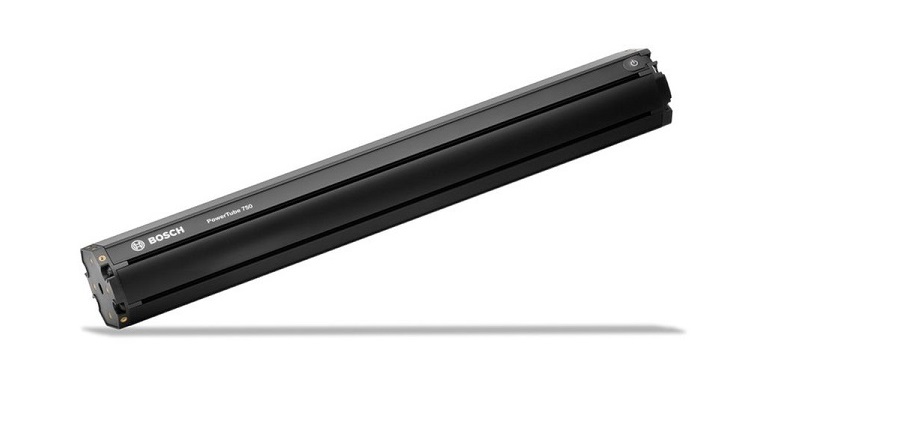Batteries are an essential component of e-bikes. One should base his choice on energy capacity, price, and size or encumbrance.
Knowing what you need to correctly choose your battery
- The quality of the battery matters
- E-MTB: how to choose the most suitable battery
- Most suitable batteries for city, cargo and trekking e-bikes
- Range anxiety should not deceive you
- Battery price per Watt and weight per Watt average ratio
- Range extender or second battery?
- Watching out for compatibility

Bosch Powermore 250 Range Extender Smart System
The quality of the battery matters
Quality brand batteries are normally about 40% more expensive than the ones you can find on cheap electric bikes. They can last longer, have a better battery management system, preventing overheating and delivering a longer-range per Watt. They more precisely display their level of charge, and deliver the same power regardless of their remaining level of charge, also slowlier depleting their charge, compared to cheap ones. Moreover, we do believe that they are much less likely to catch fire.
Range anxiety should not deceive you
Oftentimes we hear people saying that they hesitate to buy an electric car because they fear remaining stuck in the middle of nowhere with an exhausted battery. Similar frights often retain potential electric bike buyers. This worry, when overdone, is called range anxiety. Indeed, people feel anxiety whenever apprehension overwhelms rationality, emotions hindering logical reasoning. That’s why we think that the importance of range width of batteries can be overrated, sometimes prompting people to purchase batteries delivering more range than what they actually need.
Giant Energypak Downtube Battery 36 V 625 Wh
Battery price per Watt and weight per Watt average ratio
More range implies more weight, and more money
Generally speaking, quality batteries from reputed brands such as Bosch, Yamaha, Giant, to name a few, average a price of 1.3 € per Watt, VAT included. There are relevant differences, though. For instance, for the best selling energy capacity, 625 Wh, the Bosch fully integrated last Smart System battery costs on our shop only €639, tantamount to a tiny bit more than 1 € per Watt, versus €789 for the comparable 625 Wh Giant. The latter costs 1.26 euros per Watt, about 24% more expensive.
Although we can reckon an average 6 grams per Watt for high quality batteries, even regarding weight per Watt there are striking differences between one battery and another. The Giant more recent range extender, the EnergyPak Plus 200Wh, weighs 1.7 kg, therefore 8.5 g per Watt, priced at €499. The Bosch PowerMore 250Wh Range Extender weighs and costs less : 1.6 kg, so 6.4 g per Watt, and costs €469.
The bigger the battery, the lighter the weight per Watt ratio. A Giant EnergyPak Smart 800 Wh e-bike battery weighs 4.2 kg, so 5.25 grams per Watt, strikingly less than the 8.5 g per Watt of its range extender. Bigger batteries also cost less per Watt than smaller ones. For example, a Bosch PowerTube 750 Watt can be found for 725 € in our shop, whereas a PowerTube with 400 Watt, about 44% less powerful, is only 27% cheaper, at 499 €.

Giant Energypak Plus 200
E-MTB: how to choose the most suitable battery
For e-mountain bikes, weight is paramount. On one hand, they must challenge tough trails and sometimes steep climbs, both consuming much energy. On the other hand, the more agile and light they are, the better, to allow the swiftest possible handling. Therefore, it’s either you habitually climb very high, or it’s probably not worth spending more money and burdening your e-mountain bike with extra weight. Consequently, why replacing (what Giant easily allows) your PowerPack 500 Wh battery with a 625 Wh or even a 800 Wh?
Most suitable batteries for city, cargo and trekking e-bikes
City ebikes are normally used to commute, averaging not more than 15 km a day. That’s why even 300 Wh batteries can be sufficient. Cargo ebikes don’t usually ride long distances, but having to carry more weight, they are normally equipped with batteries delivering 500 to 625 Wh. Even in their case, the most powerful batteries are not the standard.
The most expensive trekking e-bikes offer high-capacity batteries, since long tours demand it.
Range extender or second battery?
City and trekking e-bikes are normally equipped with a luggage rack, on which you can fit panniers and bags. What raises the question: it’s better a range extender, delivering at most 250 Wh, or a second battery, as powerful as the original one, or even more when possible, easily hidden in a pannier or a bag on the rack? The price to power ratio of the former is really not price worthy, but it is lighter, handier and kicks in instantaneously while riding. The latter is at least twice more powerful, giving you better value for your money, but it’s heavier and requires replacing the original battery. It is also less likely to be stolen, because you normally conceal it in a bag, whereas range extenders are visible and seldom have a lock.
Before buying a second battery, take into account that, even if it stays idle, loses 3%-4% of its capacity every year. Besides, in order to extend the battery duration, you should charge at least it every 40 days to keep charge level at 40%.
It’s worth mentioning that the Bosch PowerPack 500 frame battery can also be used on many e-bikes as an additional battery, i.e. a so-called range extender.
Watching out for compatibility
Even batteries of the same manufacturers, sometimes having even the same shape and energy capacity of the original battery, are not compatible. That’s even worse for range extenders. It’s better to carefully verify the compatibility of any battery before purchasing it, controlling whether size, pins and sockets are the same, and finding the manufacturer’s recommandations.

